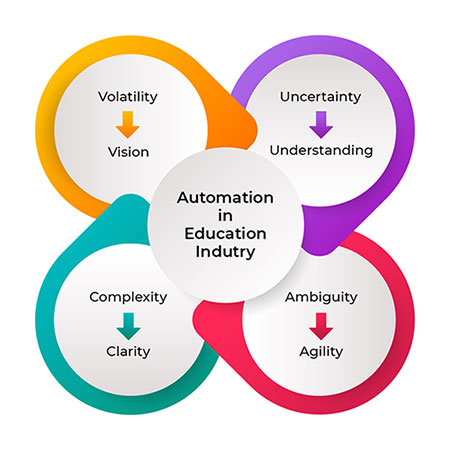
Over the past few days, we have been catching on to the term VUCA. But do you know where it originated from?
It was originally coined by the US Army to describe the situation at the end of the Cold War that was volatile, uncertain, complex, and ambiguous, but now this has been applied to the current world and to the leadership in various organizations which of course includes education. Let's wrack up our brain a little more about VUCA, what it means, and how it can apply to education today:FYI for the people who don’t know what VUCA stands for- it is an abbreviation for Volatility, Uncertainty, Complexity, Ambiguity
Defining VUCA in the world of Education
Volatility -
So volatility basically stands for the speed and turbulence of change and is oftentimes linked to the extent of information we can now access.
Historically, however, education has been slow to change (the education industry actually snailed it when it comes to technology!).
Educational Institutes today are not vastly different from the institutes in earlier times! Why?
Institutes in the Educational domain still go on with a one-size-fits-all approach sometimes called the "factory model" of education.
Great writers and educationalists (one of them - Clayton Christenson) have argued for years that the whole educational system is outdated.
It no longer prepares students for their future.
Sorry to break your bubble here but… the concept of literacy is being literally redefined. It has been often pointed out by Companies that there is a deficit of graduates emerging from universities who are ready to meet the demands, and certainly, this has to change. No doubt this will carry a crazy impact on all of the education industry.
Uncertainty -
So this block of VUCA talks about predictability and uncertain outcomes, for example, what exactly are the skills and capabilities that will be needed in the near future?
Students in institutions today will be working in the year 2030, will be dealing with totally different issues such as artificial intelligence (AI) and automation. Trust me these new techs will have already eliminated over half of our current jobs (I don’t want to scare you!), as robots and algorithms take over today's working- and middle-class employment.
If we talk about the huge number of economists and technologists even they are unable to predict what the future of work will be, even 12 years into the future.
The real question here is will current qualifications and certifications still be relevant then?
Complexity -
The third one in VUCA is Complexity.
Nowadays it sounds weird when something is not complicated, right?
So this gives birth to a number of questions that are surrounding the future of education.
Education itself is very complex with multiple parts and systems, right?
Should institutes be preparing students for university?
For work?
For life itself?
What should vocational education look like?
Technology is continuously evolving
exponentially
Students will need the skills and wits to make sense of
Ambiguity
Last comes to Ambiguity- This stands for the haziness of reality. The education industry should keep on evolving to catch up with the rapidly changing world,
If we follow down the path of traditional education which is entrenched with standardized programs then it may no longer be valid in the real world!
The VUCA world that we presently live in challenges educational institutes to not only adapt for the current roles but also future roles.
How do they plan ahead to manage and lead the changes?
Redefining VUCA- So how can we respond to VUCA?
It’s easy. Treat every part of VUCA in a new way, how? Now let's think of these letters in a different way:
Volatility calls for Vision -
We can treat these changes happening as an opportunity for teachers, students, and other stakeholders to create compelling visions for the future.
Uncertainty calls for Understanding -
This associate probing questions, exploring passions and brand-new ideas, and an immense amount of emotional intelligence and empathy.
Complexity calls for Clarity -
This can be accomplished through systems thinking and approaching problems from a holistic viewpoint.
Ambiguity calls for Agility -
Institute and teachers must be prompt to accommodate changing situations, to test and prototype, and to learn from failure.
To Attend this webinar, Register Now.



